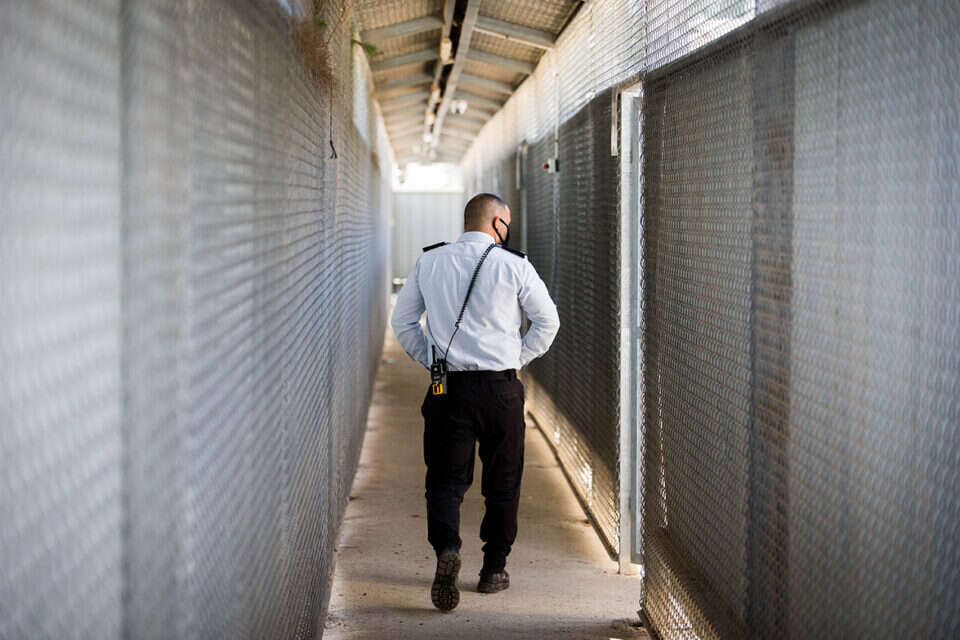The relevant law regarding entry into the country that applies to illegal workers and refugees is the Entry into Israel Law, 1952. However, this law does not apply in the Judea and Samaria areas, and therefore Palestinian residents of Judea and Samaria who entered the State of Israel without a permit are prosecuted for "violation of instruction" Concerning the closure of an area ", according to security regulations (combined version), 5769 2009
.
The law applies to both the residents themselves, both the complainants and the drivers and employers, and stipulates with the Supreme Court the punishment for entering the country illegally.
For an illegal resident, the law allows for a fine of up to NIS 2,000 and one year in prison.
But the 2014 Supreme Court ruling set the sentencing policy so that it does not exceed five months of actual imprisonment in any case.
Here, too, these are rare cases, as will be explained below.
"There is under-enforcement which is an orderly policy of the authorities regarding the enforcement of the law on the illegal residents. The official prosecution policy is not to prosecute Shabach but in its third concept," explains Adv. Arie Arbus, partner in the Arbus office, Kedem, Tzur In labor law.
For previous articles in the series:
"The fence is a national mission": A tour of the Tarkumiya checkpoint
Who will be entitled to a work permit and how are gaps in the fence avoided?
Fence without separation: Completion of construction is not in sight
He said, "The state has no interest in holding an illegal detainee in prison, and the preference is to deport them without exhausting them. Because the separation fence is broken, it is in fact a revolving door. The lowest, due to the consideration of the economic situation of the border smugglers.
However, logic teaches the opposite - the most effective way to deal with these offenses, whose main motive is financial, is through high fines. "
What happens when it comes to a person with a criminal or security past?
"In such cases the system treats him differently and tries to prosecute him already in the first perception. But even in such a case, the 'penalty compound' must meet the threshold of a maximum of five months imprisonment, including by way of probation according to the Supreme Court ruling.
"There is a failure here that feeds itself. One of the considerations for mitigation is because it is a common offense. Usually the fact that a particular offense is common, what is called a 'coup d'etat', is a consideration to aggravate the punishment and not mitigate it."
Adv. Arbus, Photo: Shachar Cohen
But when it comes to employers and drivers, the law is much stricter.
In the case of complainants, drivers or employers of illegal immigrants, who were caught at the time of the act, they may be fined up to NIS 75,000 and imprisoned for up to two years.
These are usually combined offenses - the employer is also the complainant and sometimes the driver.
There are aggravated offenses that can bring the prison sentence up to four years and the fine to hundreds of thousands of shekels.
For example, if it is a vehicle that has undergone a structural change in order to hide the illegal occupants and thus bring them into the country, if more than three illegal occupants have been found in the vehicle, if the employer is a corporation.
Law enforcement agencies also have the option of issuing administrative and judicial orders to close the business, so if a restaurant owner is caught employing illegal residents, the restaurant can be closed for a period of months - in addition to fines and criminal proceedings.
The State Comptroller's report published in June 2019 states that every day thousands of illegal immigrants from Judea and Samaria and the Jerusalem Envelope enter Israel for work.
The report states that as early as March 2002, the Security Cabinet addressed the link between the uncontrolled entry of illegal residents and terrorism. Or for criminal activity to get into so-called labor needs, but also to carry out attacks “on the road” or in a planned manner, as happened in the last wave of terror.
Defects not corrected
The State Comptroller noted as early as 2009, and then in another report in 2011 and an audit report in 2017, the many loopholes that exist in the barrier, which make it virtually ineffective.
The audit reports found that the majority of the defects were not corrected at all.
Following the latest wave of terrorism, there is an understanding in the government that a change in policy is needed in order to control those entering the country from Judea and Samaria in order to carry out terrorist attacks.
State Comptroller on the separation fence: "significant failure" // Photo: Yaron Doron
In the measures proposed in the law: the aggravation of the punishment for drivers, lodgers and employers of Shabach and the setting of minimum fines.
If the offense was committed in aggravated circumstances (transportation of several Shavuot, for example), the punishment will be aggravated to 6-7 years in prison; minimum fines for unlawful transportation of Shabach And now there is an intention to renew it at least by that amount, or more;
Seizure and forfeiture of vehicles used to transport vehicles - there is a provision that allows vehicles to be seized starting from the second seizure, but it was not actually implemented in view of legal difficulties. Now the intention is to allow seizure and forfeiture of vehicles from the first seizure Yes, it was agreed to examine the inclusion of administrative measures in the memorandum such as revocation of driver’s license and revocation of business license.
Data published here for the first time indicate a clear downward trend in law enforcement over the years.
The data were revealed after the Lavi organization contacted the IDF, the police and the prison service under the Freedom of Information Law.
The disturbing trend
The data provided by the IDF show that in 2018, 877 indictments were filed in the military prosecution for illegal entry into the country - most of them, 824, ended in a conviction. 824 ended in a fine, 818 on probation and 637 in actual imprisonment. But only in 24 They were sentenced to more than four months in prison.
In 2019, 705 indictments were filed in the military prosecution for illegal entry into the country, of which 652 ended in conviction.
638 ended in a fine, 635 on probation and 562 in actual imprisonment - only in 14 of the cases a prison sentence of more than four months was imposed.
In 2020, 519 indictments were filed in the military prosecution for illegal entry into the country, of which 435 ended in conviction.
424 ended in a fine, 433 on probation and 347 in actual imprisonment - only in seven of the cases the sentence was more than four months.
The data provided by the IPS shows a similar trend: in 2018, 3,258 prisoners served a prison sentence for an illegal stay offense, in 2019 the number of prisoners dropped to 2,858, while in 2020 the number of prisoners was only 2,070.
The data provided by the police shows a slightly different trend, although the data also refers to illegal workers and infiltrators: in 2018, 15,329 cases were opened by the police, but only 449 of them were filed by the police or the prosecutor's office. In 2019, 14,449 police cases were opened. For filing indictments 946, while in 2020 15,180 cases were opened and 1,696 of them were transferred to indictments.
When the offenses are segmented, it appears that most of them deal with the illegal entry of the residents themselves and only a small proportion of them deal with commuters, lodgers and employers.
For example, in 2018, the number of cases involving employers, lodgers and drivers was 1,075, while 14,254 cases dealt with the illegal entry of the residents themselves.
In 2019, the number of cases involving employers, lodgers and commuters stood at 1,000, while 13,441 dealt with the illegal entry of the residents themselves.
In 2020, 778 of the cases dealt with employers, lodgers and drivers, while 14,402 dealt with the illegal entry of residents.
"Meaningless Statements"
Lavi, chairman of the Lavi organization: Adv.
"We expect now, when the security damage and the high involvement of the GSS in the recent terrorist attacks have been proven, there are the enforcement authorities and in particular the Israel Police in the strategy and the lax inclusion concept.
The change should be reflected in measurable data on arrests, arrests, reports and "severe punishment - and not on meaningless statements."
Avichai Boaron, Photo: PR
Were we wrong?
Fixed!
If you found an error in the article, we'll be happy for you to share it with us









